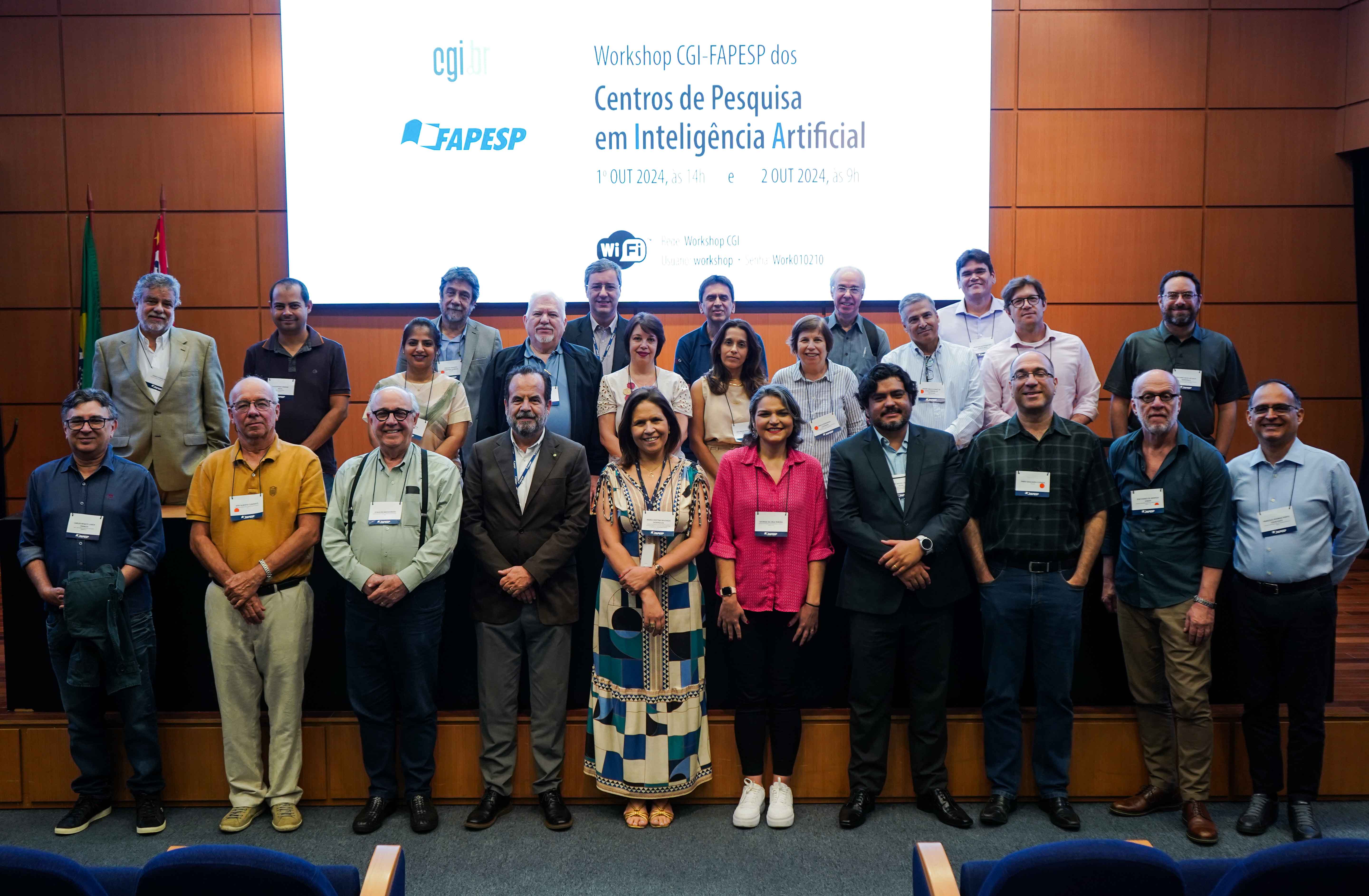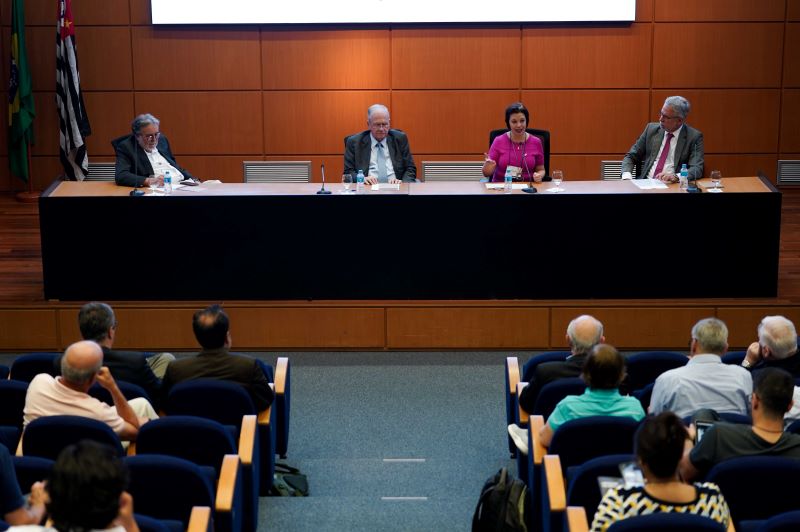

Representatives of the ten new centers took part in work sessions at FAPESP on October 1-2 (photo: Daniel Antônio/Agência FAPESP)
Located in different parts of the country, the centers will conduct research in science, technology and innovation addressing problems that can be solved by AI in such areas as health, agriculture, manufacturing, and smart cities.
Located in different parts of the country, the centers will conduct research in science, technology and innovation addressing problems that can be solved by AI in such areas as health, agriculture, manufacturing, and smart cities.

Representatives of the ten new centers took part in work sessions at FAPESP on October 1-2 (photo: Daniel Antônio/Agência FAPESP)
By Elton Alisson | Agência FAPESP – Ten new Applied Research Centers (ARCs) in Artificial Intelligence established by FAPESP in partnership with the Ministry of Science, Technology and Innovation (MCTI) and the Brazilian Internet Steering Committee (CGI.br) have the mission of fostering applications of AI in several sectors.
Located in different parts of Brazil, the ARCs will conduct research in science, technology and innovation addressing problems that can be solved by AI in such areas as health, agriculture, manufacturing, and smart cities.
FAPESP’s partnership with MCTI and CGI.br originated in an agreement, signed in 2013, to use funds remaining from the period when FAPESP managed domain registration and IP address allocation to support research projects that contribute to the development of digital technology in Brazil.
The ten centers have 95 principal investigators and 739 researchers affiliated with universities and research institutions, as well as private partners and government bodies.
Coordinated activities
Representatives of the ten new ARCs met at FAPESP on October 1-2 to discuss ways of coordinating their activities. “This is the largest AI-related initiative in progress in Brazil. The public funds to be invested in these ten advanced AI and digital tech ARCs selected in two major calls for proposals will be some BRL 100 million, with private enterprise contributing an equivalent amount,” said Marco Antonio Zago, President of FAPESP, in his opening remarks to the meeting.

Photo: Daniel Antônio/Agência FAPESP
FAPESP, MCTI and CGI.br will allocate BRL 1 million annually to each of the new centers for a period of up to ten years. A matching amount will be invested by the partner companies, bringing the total to BRL 20 million per research unit per year.
“In a sense, these ARCs in AI are the embryo of policies that are being developed at the national level, such as the Brazilian Artificial Intelligence Plan [PBIA],” said Renata Vicentini Mielli, coordinator of CGI.br.
Presented during the 5th National Conference on Science, Technology and Innovation (CNCTI), which took place in late July and early August in Brasília, the PBIA calls for investment of some BRL 23 billion in the next four years.
The plan has five major divisions: infrastructure and development; diffusion, education and training; AI to improve public services; AI for business innovation; and support for regulatory processes and governance.
“A strong effort has been made in the plan to identify sources of funds to finance the activities, but they’re concentrated in the part that’s feasible, which is public funding via vehicles such as the FNDCT [National Fund for Scientific and Technological Development]. However, most investment in AI is private anywhere in the world,” said Carlos Américo Pacheco, CEO of FAPESP.
“All these ARCs in AI have private partners, whose investment matches the public funding, but an additional effort is needed to promote more participation and investment by companies in this area.”
Integration with industry
One of the centers that could do this, Pacheco noted, is the H4I Digital Technology Hub in Salvador, Bahia state, a partnership with SENAI CIMATEC.
CIMATEC stands for Integrated Manufacturing and Technology Center, and SENAI for the National Industrial Training Service, a nonprofit run by the National Confederation of Industry (CNI).
With universities, companies like HP and Intel, and federations of industry participating, the center aims to develop an open multiuser data science and AI platform that will help modernize Brazilian industry and leverage SENAI’s nationwide capabilities to help small and medium-sized enterprises accelerate their innovation and smart manufacturing processes.
“Although the center is only just starting to operate, we already have two tools that will be added to the platform,” said Davidson Martins Moreira, H4I’s principal investigator (PI).
One of these tools is WebGRIPP, for optimization and resolution of inverse problems, a mathematical approach in which causes are calculated from effects – as opposed to the forward problem approach, in which effects are calculated from causes.
The second is WebDomus, a tool for controlling energy efficiency and thermal comfort in buildings, and for simulating pollution in closed environments. “These tools can already be added to the platform,” Moreira said.
Another initiative aimed at addressing challenges in manufacturing is the ARC in AI for Evolution to Industry 4.0, hosted by the Technological Research Institute (IPT), an arm of the São Paulo State Department of Economic Development located on the campus of the University of São Paulo (USP) in São Paulo city. With Bosch, Braskem, Siemens, Klabin and Stellantis participating, it will seek to build a knowledge platform in AI as a driver of higher productivity and competitiveness for Brazilian companies.
Research lines will be problem-oriented, targeting ways and means of enhancing competitiveness such as real-time monitoring and control, autonomous robotics and machine tools, and production chain interoperability and control, among others.
“The idea is to develop a platform with a group of people who will focus on AI-related issues from the shop floor to the top level,” said Jefferson de Oliveira Gomes, the center’s PI.
Training and upskilling
Widespread application of AI in Brazil is hindered by a lack of skilled professionals, the participants in the meeting noted. The same problem has been observed in academia, according to Fabio Cozman, PI of C4AI, the first ARC in the field set up by FAPESP and IBM (in 2020 under the aegis of FAPESP’s Engineering Research Center Program).
“The biggest difficulty we’ve had all these years has been the lack of properly trained personnel on the academic market,” Cozman said.
To promote interest in the field, C4AI’s researchers linked to knowledge diffusion have held seminars, courses and online classes. More than 100,000 people signed up for one of the distance education courses.
Other centers, such as the ARC Innovation in AI for Health, hosted by the Federal University of Minas Gerais (UFMG) in Belo Horizonte, aim to develop platforms that will foster digital literacy in health-related AI for health workers, students, teachers and older people, for example. “We need instruments for training and upskilling in AI that are far more capable than the ones we’re accustomed to using,” Pacheco said.
The ten ARCs in AI are as follows:
1. Reference Center on Artificial Intelligence (CEREIA)
FAPESP grant no.: 20/09706-7
PI: José Soares de Andrade Júnior
Host institution: Federal University of Ceará (UFC)
2. Center of Excellence in Applied Research in Artificial Intelligence for Industry
FAPESP grant no.: 20/09770-7
PIs: Antônio José da Silva Neto & Davidson Martins Moreira
Host institution: SENAI CIMATEC Integrated Manufacturing and Technology Campus
3. ARC in AI for Evolution of Industries to Standard 4.0
FAPESP grant no.: 20/09850-0
PI: Jefferson de Oliveira Gomes
Host institution: Technological Research Institute (IPT)
4. AI in the Remaking of Urban Environments (IARA)
FAPESP grant no.: 20/09835-1
PI: André Carlos Ponce de Leon Ferreira de Carvalho
Host institution: Institute of Mathematics and Computer Science, University of São Paulo (ICMC-USP)
5. Artificial Intelligence Innovation Center for Health (CIIA-Health)
FAPESP grant no.: 20/09866-4
PI: Virgilio Augusto Fernandes Almeida
Host institution: Institute of Exact Sciences, Federal University of Minas Gerais (ICE-UFMG)
6. BIOS – Brazilian Institute of Data Science
FAPESP grant no.: 20/09838-0
PI: João Marcos Travassos Romano
Host institution: School of Electrical Engineering and Computing, State University of Campinas (FEEC-UNICAMP)
7. Center of Excellence in AI for Cybersecurity
FAPESP grant no.: 22/00741-0
PI: Teresa Bernarda Ludermir
Host institution: Informatics Center, Federal University of Pernambuco (CI-UFPE)
8. Research Center for Really Applied AI: education in the 4th industrial revolution (PRAIA Education)
FAPESP grant no.: 22/00688-1
PI: Geber Lisboa Ramalho
Host institution: Informatics Center, Federal University of Pernambuco (CI-UFPE)
9. Data Science for Smart Industry (CDII)
FAPESP grant no.: 23/14427-8
PI: José Alberto Cuminato
Host institution: Institute of Mathematics and Computer Science, University of São Paulo (ICMC-USP)
10. Center of Excellence in AI for Renewable Energy
FAPESP grant no.: 22/00720-2
PI: Alvaro Luiz Gayoso de Azeredo Coutinho
Host institution: Alberto Luiz Coimbra Institute of Graduate Studies and Research in Engineering, Federal University of Rio de Janeiro (COPPE-UFRJ)
Republish
The Agency FAPESP licenses news via Creative Commons (CC-BY-NC-ND) so that they can be republished free of charge and in a simple way by other digital or printed vehicles. Agência FAPESP must be credited as the source of the content being republished and the name of the reporter (if any) must be attributed. Using the HMTL button below allows compliance with these rules, detailed in Digital Republishing Policy FAPESP.





